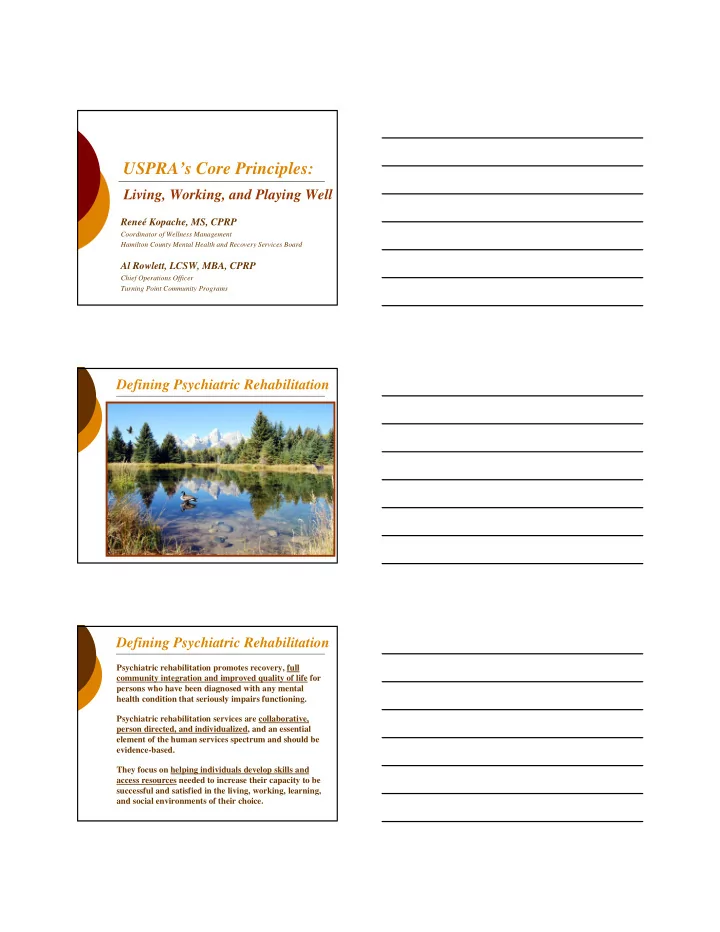

USPRA’s Core Principles: Living, Working, and Playing Well Reneé Kopache, MS, CPRP Coordinator of Wellness Management Hamilton County Mental Health and Recovery Services Board Al Rowlett, LCSW, MBA, CPRP Chief Operations Officer Turning Point Community Programs Defining Psychiatric Rehabilitation Defining Psychiatric Rehabilitation Psychiatric rehabilitation promotes recovery, full community integration and improved quality of life for persons who have been diagnosed with any mental health condition that seriously impairs functioning. Psychiatric rehabilitation services are collaborative, person directed, and individualized, and an essential element of the human services spectrum and should be evidence-based. They focus on helping individuals develop skills and access resources needed to increase their capacity to be successful and satisfied in the living, working, learning, and social environments of their choice.
Core Principles & Values The core principles and values are meant to further describe key elements of psychiatric rehabilitation practice. Principle 6: Psychiatric rehabilitation practices support full integration of people in recovery into their communities where they can exercise their rights of citizenship, as well as to accept the responsibilities and explore the opportunities that come with being a member of a community and a larger society. � SAMHSA Consensus Statement on recovery: � Self-direction � Empowerment � Responsibility Core Principles & Values Principle 8: Psychiatric rehabilitation practices facilitate the development of personal support networks by utilizing natural supports within communities, peer support initiatives, and self- and mutual-help groups. � SAMHSA Consensus Statement on recovery: � Peer Support Principle 9: Psychiatric rehabilitation practices strive to help individuals improve the quality of all aspects of their lives; including social, occupational, educational, residential, intellectual, spiritual, and financial. � SAMHSA Consensus Statement on recovery: � Holistic Community Integration
Community Integration Community integration is defined as… The opportunity to live in the community and be valued for one’s uniqueness and abilities, like everyone else. Salzer, Mark, eidtor (2006) Psychiatric Rehabilitation Skills in Practice: A CPRP Preparation and Skills Workbook , pg, 1 . USPRA: Linthicum, MD Community Integration Community Integration Outcomes Community Presence and Participation Community Integration (Opportunity) Well-Being and Recovery UPENN Collaboration on Community Integration: www.upennrrtc.org Integration: Living Well The Five R’s: � R ecovery � R esidence � R oles � R elationships � R esponsibility
Integration: Working Well CAREER : � C reating an Identity � A spirations � R espected (valued) � E quality � E xperiencing growth � R esponsibility Integration: Playing Well THRIVE: � T ime � H ealthy � R ecreation � I nteractive � V acation � E ngaged In other words…. � Community integration is about more than having a job, place to live, food to eat, and “peer” support. � It involves an identity shift….from “being mentally ill” to being a person � It involves being involved….not socially isolated and inactive � It involves having a life, and living life, beyond mental illness and the mental health system …including having a role in the community that doesn’t involve mental illness (neighbor, volunteer, coach, parent, voter, etc.)
In Other Words Con’t � It involves being a part of a social network based on common roles/interests rather than having a psychiatric condition � It involves being a citizen and having all of the responsibilities of citizenship � It is the right of all people Redefining Supports Changes in Types of Peer Support Across Stages of Recovery 12 10 10 10 10 10 Importance of type of peer support 8 (10 = most, 1 = least) 7 7 7 7 6 4 4 4 4 4 3 2 1 1 1 0 Hope Empow erment Self-Responsibility Meaningful Role Stages of recovery non-structured contact (hospital, agency) Tx program/group peer to peer/self-help natural support
The Integration Process Stages of Recovery Level of Integration Hope Empowerment Responsibility Meaningful Role Little or none X X Partial X X X X Full X X X X Supporting Community Integration HOPE HEALING AUTHORITY ENGAGEMENT Anderson, G. and B. (2004) Recovery Oriented Leadership. Community Activators and MHA Village. What does HOPE mean to you?
What does HEALING mean to you? What does AUTHORITY mean to you? What does ENGAGEMENT mean to you?
What do staff say about the individuals we are privileged to serve and the services provided? ����������� ������� ���������� ������� ������� You want your services to reflect the following: Personal circles of support The Citizen or Community Member The person’s home, a local business, the neighborhood school Quality of life as experienced by the person affected Individual Support Self-determination and relationships Personal Futures Plan
Interventions Listening is the key to this work. The best motivational advice we can give you is to listen carefully to individuals your serve. They will tell you what has worked and what hasn’t. What moved them forward and shifted them backward. Whenever you are in doubt about what to do, LISTEN . Miller & Rollnick (2002) Motivational Interviewing Interventions con’t 1) Ask open ended questions a. Disadvantages of the status quo b. Advantages of change c. Optimism about change d. Intention to change 2) Using the importance ruler 3) Exploring the importance ruler (scale of 1-10) 4) Elaborating Interventions con’t 5) Querying extremes 6) Looking Back 7) Looking Forward 8) Exploring Goals & Values Miller & Rollnick (2002) Motivational Interviewing
Q & A and Contact Information Renee Kopache Hamilton County Mental Health and Recovery Services Board reneek@hamilton.mhrsb.state.oh.us Alfred Rowlett Turning Point Community Programs AlRowlett@tpcp.org
Recommend
More recommend